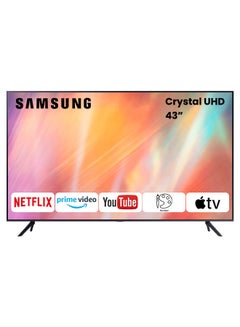Highlights- Immerse yourself in the picture with one billion shades of color
- Powerful 4K upscaling ensures you get up to 4K resolution for the content you love
- High dynamic range increases the range of light levels on your TV so you can enjoy an enormous spectrum of colors and all the visual details, in even the darkest scenes
- Dynamic crystal color delivers lifelike variations so you can see every subtlety
- You'll also experience more lifelike color expressions due to its sophisticated color mapping technology
- A sleek and elegant design that draws you to the purest picture
- Keep your cables tidy and conceal them, reducing clutter and keeping a seamless look for your TV
- 4K UHD TV goes beyond regular FHD with 4x more pixels, offering your eyes the sharp and crisp images they deserve. Now you can see even the small details in the scene
OverviewSamsung, South Korean company that is one of the world’s largest producers of electronic devices. Samsung specializes in the production of a wide variety of consumer and industry electronics, including appliances, digital media devices, semiconductors, memory chips, and integrated systems. It has become one of the most-recognizable names in technology and produces about a fifth of South Korea’s total exports. Samsung was founded as a grocery trading store on March 1, 1938, by Lee Byung-Chull. He started his business in Taegu, Korea, trading noodles and other goods produced in and around the city and exporting them to China and its provinces. After the Korean War, Lee expanded his business into textiles and opened the largest woolen mill in Korea. He focused heavily on industrialization with the goal of helping his country redevelop itself after the war. During that period his business benefited from the new protectionist policies adopted by the Korean government, whose aim was to help large domestic conglomerates (chaebol) by shielding them from competition and providing them easy financing. During the 1970s the company expanded its textile-manufacturing processes to cover the full line of production—from raw materials all the way to the end product—to better compete in the textile industry. New subsidiaries such as Samsung Heavy Industries, Samsung Shipbuilding, and Samsung Precision Company (Samsung Techwin) were established. Also, during the same period, the company started to invest in the heavy, chemical, and petrochemical industries, providing the company a promising growth path. The company continued to make advancements on the technology and product-quality fronts, with a number of its technology products—ranging from semiconductors to computer-monitor and LCD screens—climbing into top-five positions in global market share.
Free & Easy Returns
Best Deals

